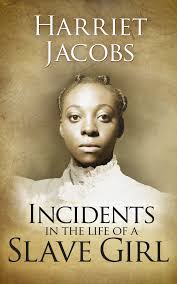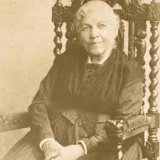Incidents in the Life of a Slave Girl Page #8
Incidents in the Life of a Slave Girl, written by herself is an autobiography by Harriet Jacobs, a mother and fugitive slave, published in 1861 by L. Maria Child, who edited the book for its author. Jacobs used the pseudonym Linda Brent.
His first impulse was to run; but his legs trembled so that he could not stir. He turned to confront his antagonist, and behold, there stood his old master's next door neighbor! He thought it was all over with him now; but it proved otherwise. That man was a miracle. He possessed a goodly number of slaves, and yet was not quite deaf to that mystic clock, whose ticking is rarely heard in the slaveholder's breast. "Ben, you are sick," said he. "Why, you look like a ghost. I guess I gave you something of a start. Never mind, Ben, I am not going to touch you. You had a pretty tough time of it, and you may go on your way rejoicing for all me. But I would advise you to get out of this place plaguy quick, for there are several gentlemen here from our town." He described the nearest and safest route to New York, and added, "I shall be glad to tell your mother I have seen you. Good by, Ben." Benjamin turned away, filled with gratitude, and surprised that the town he hated contained such a gem--a gem worthy of a purer setting. This gentleman was a Northerner by birth, and had married a southern lady. On his return, he told my grandmother that he had seen her son, and of the service he had rendered him. Benjamin reached New York safely, and concluded to stop there until he had gained strength enough to proceed further. It happened that my grandmother's only remaining son had sailed for the same city on business for his mistress. Through God's providence, the brothers met. You may be sure it was a happy meeting. "O Phil," exclaimed Benjamin, "I am here at last." Then he told him how near he came to dying, almost in sight of free land, and how he prayed that he might live to get one breath of free air. He said life was worth something now, and it would be hard to die. In the old jail he had not valued it; once, he was tempted to destroy it; but something, he did not know what, had prevented him; perhaps it was fear. He had heard those who profess to be religious declare there was no heaven for self-murderers; and as his life had been pretty hot here, he did not desire a continuation of the same in another world. "If I die now," he exclaimed, "thank God, I shall die a freeman!" He begged my uncle Phillip not to return south; but stay and work with him, till they earned enough to buy those at home. His brother told him it would kill their mother if he deserted her in her trouble. She had pledged her house, and with difficulty had raised money to buy him. Would he be bought? "No, never!" he replied. "Do you suppose, Phil, when I have got so far out of their clutches, I will give them one red cent? No! And do you suppose I would turn mother out of her home in her old age? That I would let her pay all those hard-earned dollars for me, and never to see me? For you know she will stay south as long as her other children are slaves. What a good mother! Tell her to buy you, Phil. You have been a comfort to her, and I have been a trouble. And Linda, poor Linda; what'll become of her? Phil, you don't know what a life they lead her. She has told me something about it, and I wish old Flint was dead, or a better man. When I was in jail, he asked her if she didn't want him to ask my master to forgive me, and take me home again. She told him, No; that I didn't want to go back. He got mad, and said we were all alike. I never despised my own master half as much as I do that man. There is many a worse slaveholder than my master; but for all that I would not be his slave." While Benjamin was sick, he had parted with nearly all his clothes to pay necessary expenses. But he did not part with a little pin I fastened in his bosom when we parted. It was the most valuable thing I owned, and I thought none more worthy to wear it. He had it still. His brother furnished him with clothes, and gave him what money he had. They parted with moistened eyes; and as Benjamin turned away, he said, "Phil, I part with all my kindred." And so it proved. We never heard from him again. Uncle Phillip came home; and the first words he uttered when he entered the house were, "Mother, Ben is free! I have seen him in New York." She stood looking at him with a bewildered air. "Mother, don't you believe it?" he said, laying his hand softly upon her shoulder. She raised her hands, and exclaimed, "God be praised! Let us thank him." She dropped on her knees, and poured forth her heart in prayer. Then Phillip must sit down and repeat to her every word Benjamin had said. He told her all; only he forbore to mention how sick and pale her darling looked. Why should he distress her when she could do him no good? The brave old woman still toiled on, hoping to rescue some of her other children. After a while she succeeded in buying Phillip. She paid eight hundred dollars, and came home with the precious document that secured his freedom. The happy mother and son sat together by the old hearthstone that night, telling how proud they were of each other, and how they would prove to the world that they could take care of themselves, as they had long taken care of others. We all concluded by saying, "He that is willing to be a slave, let him be a slave." V. The Trials Of Girlhood. During the first years of my service in Dr. Flint's family, I was accustomed to share some indulgences with the children of my mistress. Though this seemed to me no more than right, I was grateful for it, and tried to merit the kindness by the faithful discharge of my duties. But I now entered on my fifteenth year--a sad epoch in the life of a slave girl. My master began to whisper foul words in my ear. Young as I was, I could not remain ignorant of their import. I tried to treat them with indifference or contempt. The master's age, my extreme youth, and the fear that his conduct would be reported to my grandmother, made him bear this treatment for many months. He was a crafty man, and resorted to many means to accomplish his purposes. Sometimes he had stormy, terrific ways, that made his victims tremble; sometimes he assumed a gentleness that he thought must surely subdue. Of the two, I preferred his stormy moods, although they left me trembling. He tried his utmost to corrupt the pure principles my grandmother had instilled. He peopled my young mind with unclean images, such as only a vile monster could think of. I turned from him with disgust and hatred. But he was my master. I was compelled to live under the same roof with him--where I saw a man forty years my senior daily violating the most sacred commandments of nature. He told me I was his property; that I must be subject to his will in all things. My soul revolted against the mean tyranny. But where could I turn for protection? No matter whether the slave girl be as black as ebony or as fair as her mistress. In either case, there is no shadow of law to protect her from insult, from violence, or even from death; all these are inflicted by fiends who bear the shape of men. The mistress, who ought to protect the helpless victim, has no other feelings towards her but those of jealousy and rage. The degradation, the wrongs, the vices, that grow out of slavery, are more than I can describe. They are greater than you would willingly believe. Surely, if you credited one half the truths that are told you concerning the helpless millions suffering in this cruel bondage, you at the north would not help to tighten the yoke. You surely would refuse to do for the master, on your own soil, the mean and cruel work which trained bloodhounds and the lowest class of whites do for him at the south.
Translation
Translate and read this book in other languages:
Select another language:
- - Select -
- 简体中文 (Chinese - Simplified)
- 繁體中文 (Chinese - Traditional)
- Español (Spanish)
- Esperanto (Esperanto)
- 日本語 (Japanese)
- Português (Portuguese)
- Deutsch (German)
- العربية (Arabic)
- Français (French)
- Русский (Russian)
- ಕನ್ನಡ (Kannada)
- 한국어 (Korean)
- עברית (Hebrew)
- Gaeilge (Irish)
- Українська (Ukrainian)
- اردو (Urdu)
- Magyar (Hungarian)
- मानक हिन्दी (Hindi)
- Indonesia (Indonesian)
- Italiano (Italian)
- தமிழ் (Tamil)
- Türkçe (Turkish)
- తెలుగు (Telugu)
- ภาษาไทย (Thai)
- Tiếng Việt (Vietnamese)
- Čeština (Czech)
- Polski (Polish)
- Bahasa Indonesia (Indonesian)
- Românește (Romanian)
- Nederlands (Dutch)
- Ελληνικά (Greek)
- Latinum (Latin)
- Svenska (Swedish)
- Dansk (Danish)
- Suomi (Finnish)
- فارسی (Persian)
- ייִדיש (Yiddish)
- հայերեն (Armenian)
- Norsk (Norwegian)
- English (English)
Citation
Use the citation below to add this book to your bibliography:
Style:MLAChicagoAPA
"Incidents in the Life of a Slave Girl Books." Literature.com. STANDS4 LLC, 2025. Web. 23 Feb. 2025. <https://www.literature.com/book/incidents_in_the_life_of_a_slave_girl_947>.








Discuss this Incidents in the Life of a Slave Girl book with the community:
Report Comment
We're doing our best to make sure our content is useful, accurate and safe.
If by any chance you spot an inappropriate comment while navigating through our website please use this form to let us know, and we'll take care of it shortly.
Attachment
You need to be logged in to favorite.
Log In